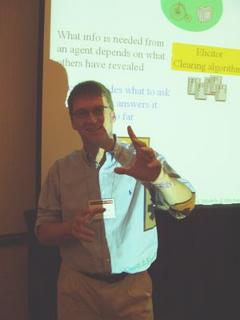After experiencing the veritable wonder of the Westin's "heavenly" showers, I headed up to the 3rd floor registration, where the friendly staff quickly decked me out with assorted conference memorabilia. This is fun, I thought! Then I trooped over to Westmoreland East for Rada Mihalcea and Ted Pedersen's tutorial session on "Advances in Word Sense Disambiguation". I found their presentation to be very accessible, and an excellent overview and introduction to the topic. Ideas which piqued my interest are "bootstrapping", where you start with a small collection of labeled data (for use in a classifier) and use the collection to classify unlabeled data, and when confident, add it to the labeled training examples to use in future classification. Another really neat idea is to take advantage of the web as a "collective mind", where visitors to a web site help to train a classifier to disambiguate word sense. Rada Mihalcea (who created the online system called
Teach Computers.org) did admit that one of the main challenges with this approach is motivating web users to participate in such a project, and she suggested that it be formulated in terms of a game or competition. I've found with some of my own projects (such as
Gender Guesser) that users are willing to contribute part of their "mind" to a web site if the web site gives them something back in return (for example, in my Gender Guesser case they contribute all sorts of unusual first names, and get back the gender of these names in return.) Another form of payback from such a website would be to gain prestige within an online community, perhaps how Slashdot gives points to users based on the frequency and ratings of their posts. This "collective web mind" harvesting approach is also something that our group is working on for training our
Song Search by Tapping system.
What I really liked about Mihalcea and Pedersen's talk is that they took the time to put together lists of resources for aspiring researchers in this field, including several freely available algorithm implementations such as SenseTools, SenseRelate, SenseLearner, and Unsupervised SenseClusters.
 In the afternoon I attended Tuomas Sandholm's tutorial session on Market Clearing Algorithms, and I found his topic frankly quite fascinating!! One area he discussed was mechanism design for multi-item auctions, which are for "multiple distinguishable items when bidders have preferences over combinations of items: complementarity and substitutability". Some examples he gave of these type of auctions are in transportation, where a trucker would be willing to accept a lower rate if he/she wins the contract to transport goods both to and from a destination (as opposed to just one way). On the way to our hotel I observed that our taxi was equipped with a fairly sophisticated wireless computer system, and I thought how these type of auctions could also be relevant to taxi fare determination.
In the afternoon I attended Tuomas Sandholm's tutorial session on Market Clearing Algorithms, and I found his topic frankly quite fascinating!! One area he discussed was mechanism design for multi-item auctions, which are for "multiple distinguishable items when bidders have preferences over combinations of items: complementarity and substitutability". Some examples he gave of these type of auctions are in transportation, where a trucker would be willing to accept a lower rate if he/she wins the contract to transport goods both to and from a destination (as opposed to just one way). On the way to our hotel I observed that our taxi was equipped with a fairly sophisticated wireless computer system, and I thought how these type of auctions could also be relevant to taxi fare determination.
Other interesting points which Tuomas discussed involved the game theory of auctions, and problems such as a single agent using pseudonyms to pose as multiple agents, and collusion between agents. Now that many auctions are occurring virtually, preventing these problems becomes more difficult. Another set of ideas deal with the concept of an "elicitor" which facilitates the auction by "deciding what to ask from which bidder". Interestingly enough, with an elicitor there is an incentive for answering truthfully as long as all the other agents are also answering truthfully.
 In the afternoon I attended Tuomas Sandholm's tutorial session on Market Clearing Algorithms, and I found his topic frankly quite fascinating!! One area he discussed was mechanism design for multi-item auctions, which are for "multiple distinguishable items when bidders have preferences over combinations of items: complementarity and substitutability". Some examples he gave of these type of auctions are in transportation, where a trucker would be willing to accept a lower rate if he/she wins the contract to transport goods both to and from a destination (as opposed to just one way). On the way to our hotel I observed that our taxi was equipped with a fairly sophisticated wireless computer system, and I thought how these type of auctions could also be relevant to taxi fare determination.
In the afternoon I attended Tuomas Sandholm's tutorial session on Market Clearing Algorithms, and I found his topic frankly quite fascinating!! One area he discussed was mechanism design for multi-item auctions, which are for "multiple distinguishable items when bidders have preferences over combinations of items: complementarity and substitutability". Some examples he gave of these type of auctions are in transportation, where a trucker would be willing to accept a lower rate if he/she wins the contract to transport goods both to and from a destination (as opposed to just one way). On the way to our hotel I observed that our taxi was equipped with a fairly sophisticated wireless computer system, and I thought how these type of auctions could also be relevant to taxi fare determination.
3 Comments:
Good design!
[url=http://svduwdsp.com/kgmg/erql.html]My homepage[/url] | [url=http://irelaxnh.com/gbzs/rewx.html]Cool site[/url]
Thank you!
My homepage | Please visit
Thank you!
http://svduwdsp.com/kgmg/erql.html | http://suskgqjl.com/gezy/dray.html
Post a Comment
<< Home